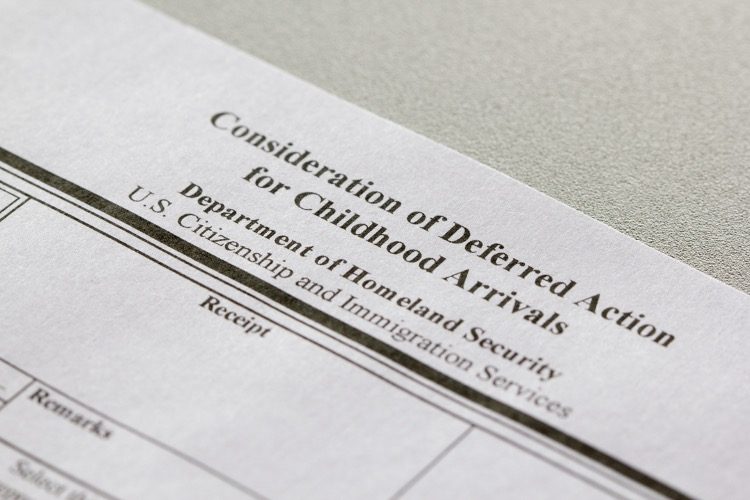
Migration proponents may have once been confident in DACA’s future, but the immigration bill pushed by the White House suggests the political will to fight for the controversial Obama-era policy is gradually fading amid a rise in anti-migration sentiment.
A recent piece over at NBC News laments the exclusion of DACA codification from Democrats’ dead-on-arrival border proposal, arguing that it signals a rightward national shift on the question of illegal migration.
The piece advocates on behalf of both so-called Dreamers and DACA recipients.
The term “Dreamers” originates from legislation proposed in 2001, aiming to offer a pathway to citizenship for a specific group of young immigrants. This group encompasses more than 500,000 individuals shielded from deportation under the Deferred Action for Childhood Arrivals (DACA) program. DACA permits eligible young adults to pursue education and employment in the United States.
However, not all Dreamers are enrolled in DACA, as not all are eligible. It is estimated that there are more than 1.1 million Dreamers currently not covered by DACA.
NBC notes that Dreamers and concern for their plight have gone from being a potent political force in electoral politics to wielding waning relevance in contemporary political debates. NBC’s Suzanne Gamboa writes:
The omission of Dreamers is a stark difference from the previous decade, when Congress could not ignore them. They formed a powerful youth-led lobby, staging nonviolent sit-ins in congressional offices, led rallies and marches, and worked on campaigns.
But Congress has rebuffed them for so long and missed so many opportunities to reconcile their status in the U.S. that many of the first Dreamers to press for legalization are well into adulthood; some who were eligible to change their status have become citizens, professionals and members of the military, while others are still struggling as longtime residents without legal status.
The article also relates that even the liberal University of California system backed off of a vote on a proposal that would have allowed students without a legal migrant status to hold on-campus jobs. Michael Drake, president of the University of California, said he was worried doing so could put illegal alien students in jeopardy of being criminally prosecuted and deported.
The Biden-backed migration deal was killed during a procedural vote on Wednesday of last week. Donald Trump had urged Republicans to oppose the bill, arguing it would give Democrats the Ukraine funding they sought without adequately securing the southern border.
DACA has faced several legal challenges since its inception in 2012, when Barack Obama signed the program into existence via executive mandate after failing to cajole Congress into passing the DREAM Act.
In 2014, Texas and 25 other states challenged DACA in court, arguing it was an unlawful exercise of executive power. The case reached the Supreme Court in 2016, which deadlocked 4-4, leaving DACA in place but not resolving its legality.
In 2017, the Trump administration announced its intention to rescind DACA, triggering new lawsuits. Several federal courts blocked the rescission, finding it violated administrative procedures.
Then in 2020, the Supreme Court, in a 5-4 decision, ruled that the Trump administration’s rescission of DACA was procedurally flawed, leaving the program in place but not addressing its underlying legality.
The next year, a federal judge in Texas ruled DACA unlawful, arguing it exceeded the Obama administration’s executive authority. This order blocked new applications and renewals, but allowed existing recipients to maintain their status for the time being.
And in 2022, the Biden administration appealed the Texas ruling, and a federal appeals court temporarily allowed new applications and renewals to resume.
Currently, existing DACA grants remain valid. Renewals are accepted and processed and new applications are still blocked due to court orders. But the legal challenge in Texas is ongoing, with further appeals and potential Supreme Court involvement possible. Thus, the future of DACA remains uncertain and is dependent on the shifting American political landscape.
The current woes faced by DACA spell good news for the nation’s migration hawks, who have, despite vehement opposition from the mainstream media and the establishment of both parties, made gradual-but-significant gains over the last decade. Where once talk of curtailing immigration was taboo, the Right has increasingly (with no small help from Donald Trump) normalized discussion of the problems presented by unchecked mass migration.
Democrats themselves have inadvertently helped the conservative cause, as some of the biggest victims of America’s virtual open border have been Democratic strongholds such as New York City.
For millions of Americans, the migration debate is no longer a merely theoretical one. It is one that is confronting them first-hand and directly impacting their quality of life due to rising crime and rising taxes as the government copiously spends taxpayer dollars to house and feed the migrant arrivals.
In short, Democrats for years promised the public that opening the border would be a great blessing to the country. Under Biden, they have had the chance to put their radical ideas into practice and in the process have only proven conservatives right.




